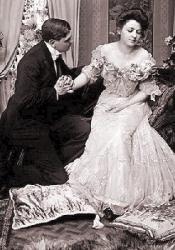Marriage in the Victorian Era
In the Victorian era there were rules to follow about marriage. There was a “marriage season” where many relationships had been put in place with a plan to the future in which was beginning a serious journey with marriage being the ultimate goal. Until 1823 the legal age in England for marriage was 21 years for men and women although after 1823 a male could marry as young as 14 without parental consent and a girl at 12 although most girls didn’t marry until around the ages of 18 to 23. it was also illegal to marry a deceased wife’s sister, but you could marry a first cousin. marriage was also only between one class so you couldn’t Mary down at class or upper class and if it did happen it was rare and most likely against the families wishes. Families had a big say into the marriage of two people. In the upper-class marriages, the wife often brought a generous Dowery and enticement for the marriage. The finances of a marriage were openly discussed, and they had to have a prenuptial agreement. A man had to prove his worth and keeping his wife at a level that she was a custom too so if she was in a high class, he had to make sure her lifestyle stayed the same. At the time women didn’t really work so they would go from living at their house with her father and he was the person that financially supported her to then her husband who had to do the same. marriages were considered business deals very few started with love but in some situations, years may have passed, and a couple cold grow tolerable to each other or even find love in the process. Back then divorce was very look down upon. When someone was to get engaged there was a very deep background that went into it as regarding the families with financial history and political connections. engagement wasn’t really how it is now it was very clear with distinct language in person and a woman never really had to except her first proposal. A woman had many suitors and before and engagement happened she could have many options at a time. To announce an engagement most of the time the family would have a huge party and I am most of the time it was to introduce the man to the women’s family. Then the bride will be introduced to his. Once a couple was engaged, they could maybe be a little more intimate and by intimate, I mean take a stroll alone, hold hands in public and take unchaperoned rides. If an engagement ended and never lead to a marriage it was very embarrassing not only to them but the families too.
In Middlemarch marriage is something that is very important to the storyline. There is a slow progression in interest between Mary Garth and Fred Vincy. Rosamond Vincy and Lydgate become engaged and eventually get married, although this relationship isn’t really excepted by Rosamond’s family because Lydgate doesn’t really have a career in which would make him a successful man in regard to money. Through the couples in Middlemarch, George Eliot expresses that marriage is a journey that requires work and constant evolving of one’s perspective of themselves and their partners. When Dorothea meets Casaubon completely loses her state of mind as she is very intrigued by him while he gives no care to her desires. Casaubon’s supposed wisdom and intelligence excited Dorothea because she hopes his influence helps her to become more educated. Their courtship was a short one and Casaubon continuously hinted that brief courtships make an unsteady marriage. Their marriage was finalized through letters rather than getting to know each other face to face. Casaubon after they get married does not really care for Dorothea leading her to question her worth as he won’t include her in his studies. They both become unhappy in their marriage and as Casaubon then becomes ill it was not ideal in their situation.

